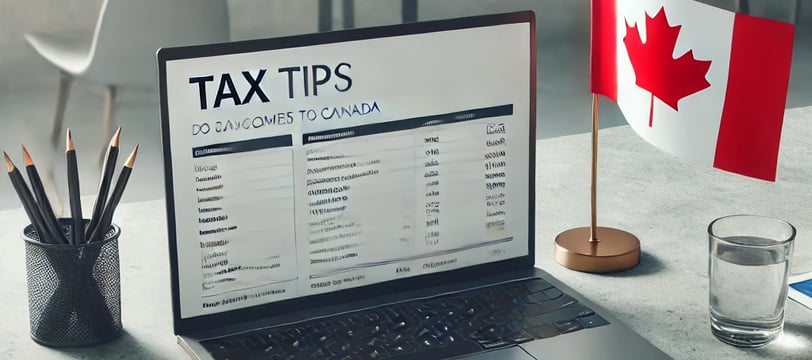What You Should Know as a Newcomer to Canada for Tax Purposes
Do’s and Don’ts
Shihan Haniff
3/20/20252 min read


Moving to Canada is an exciting journey, but understanding the country’s tax system is crucial to ensure compliance and avoid unnecessary penalties. As a newcomer, there are key do’s and don’ts to keep in mind when filing your taxes for the first time.
Do’s
Determine Your Residency Status
The Canada Revenue Agency (CRA) determines your tax obligations based on your residency status. Most newcomers are considered residents for tax purposes once they establish significant ties in Canada.
Apply for a Social Insurance Number (SIN)
You need a SIN to work in Canada and to file your taxes. Apply for one as soon as possible through Service Canada.
Report Worldwide Income
As a Canadian tax resident, you must report income earned both inside and outside Canada. This includes employment income, rental income, and investment income from foreign sources.
File Your Taxes on Time
The tax filing deadline for individuals is April 30 each year. If you or your spouse are self-employed, the deadline is June 15, but any balance owing is still due by April 30.
Keep Track of Your Expenses and Deductions
Certain expenses, such as moving costs, childcare, tuition fees, and medical expenses, may be deductible. Keeping records will help maximize your tax benefits.
Apply for Benefits and Credits
As a newcomer, you may be eligible for the Canada Child Benefit (CCB), the GST/HST credit, and other tax incentives. File your tax return to access these benefits.
Open a Canadian Bank Account
Having a Canadian bank account helps in tracking financial transactions, making tax filing easier, and receiving direct deposit for tax refunds and government benefits.
Don’ts
Don’t Ignore Filing Taxes Even If You Have No Income
Even if you have no income, filing a tax return ensures you remain eligible for tax credits and benefits.
Don’t Forget to Declare Foreign Assets Over CAD 100,000
If you own foreign property valued over CAD 100,000, including real estate, stocks, or bank accounts, you must report them to the CRA.
Don’t Overlook Tax Treaty Benefits
Canada has tax treaties with many countries to prevent double taxation. If you are earning foreign income, check if a tax treaty applies to reduce your tax burden.
Don’t Miss RRSP and TFSA Opportunities
Registering for a Registered Retirement Savings Plan (RRSP) or a Tax-Free Savings Account (TFSA) can help you save on taxes and grow your wealth.
Don’t Rely on Unofficial Advice
Always refer to CRA guidelines or consult a tax professional to ensure you follow accurate tax practices and avoid costly mistakes.
Don’t Delay Updating Your Address with the CRA
If you move, notify the CRA immediately to receive important notices and benefits on time.
Don’t Assume Canadian and Foreign Tax Systems Are the Same
Tax rules in Canada may differ from those in your home country. Take the time to understand deductions, credits, and tax filing requirements.
Final Thoughts
Understanding the Canadian tax system as a newcomer is essential for financial success. By following these do’s and don’ts, you can ensure compliance, take advantage of tax benefits, and avoid unnecessary penalties. If you’re unsure about any tax matter, seek guidance from a professional to navigate the process smoothly.
Prepared by: Mohomed Shihan Haniff
Business & Financial Consultant | Senior Lecturer
